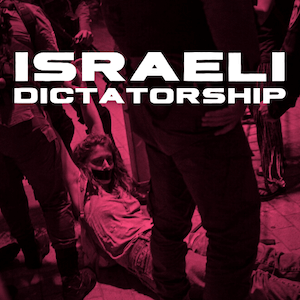
The natural thing for me to do in a time of such a bloody war is to demonstrate daily and demand that Israel “Stop the War!” But Israel’s police, led by extreme right-winger Itamar Ben-Gvir, has succeeded, so far, in preventing any demonstrations. So, to compensate for my enforced silence, I have promised Mondoweiss to intensify my reporting about this awful war, and the way we are experiencing it in Haifa.
I have already described in detail how Israel has become a full-scale dictatorship (you can follow my reporting here). Every day, we encounter more mind-blowing examples of political repression, as well as some brave attempts to break the silence. I will do my best to keep you updated.
A surge in the number of Palestinian prisoners
Caring for Palestinian prisoners is always high on our minds and a central part of our activities. Before October 7, there were about 5,200 Palestinian political prisoners and POWS in the occupation prisons. Since then, another 2,500 Palestinians have been detained in the West Bank, most of them kidnapped from their homes in violent army nightly raids on towns and villages. As some were released, it was estimated by knowable sources that I spoke with that the number of prisoners from the West Bank is now around 7,000. According to Addameer, the Prisoner Support and Human Rights Association in Ramallah, of those 7,000 Palestinian prisoners, 2,070 are under administrative detention, and 200 are children.
Add to these prisoners from Gaza. Thousands of workers from Gaza had permission to work inside 48 Palestine had their work and stay licenses abolished on October 7. Just today, I heard testimonies from some friends that described how big forces of police and border guards encircled Palestinian townships in a hunt for Gazan workers. Some 4,000 workers from the Gaza Strip were initially held in hastily improvised detention centers in the West Bank, without the basic needs or legal status. Many were sent back to Gaza, but it is estimated that more than 700 of these workers are still being held. Less is known about the fate of hundreds or even thousands of people from Gaza that were caught by Israel around the strip or detained by the invading army and are interrogated and now being held in the legal limbo of “illegal combatants.”
Finally, there are many hundreds of Palestinians from inside the Green Line, citizens of Israel, who have been detained for expressing solidarity with the suffering of the people of Gaza. Many of them are held now in harsh conditions in the “security prison” in Megiddo. As my dispatches are mostly about what we call al-Dakhel (“the within”), or ’48 Palestine, you will be able to read more about some of them, what they are accused of, what happens to them in prison, and how they are tried, in future posts.
Another attempt to demonstrate in Haifa
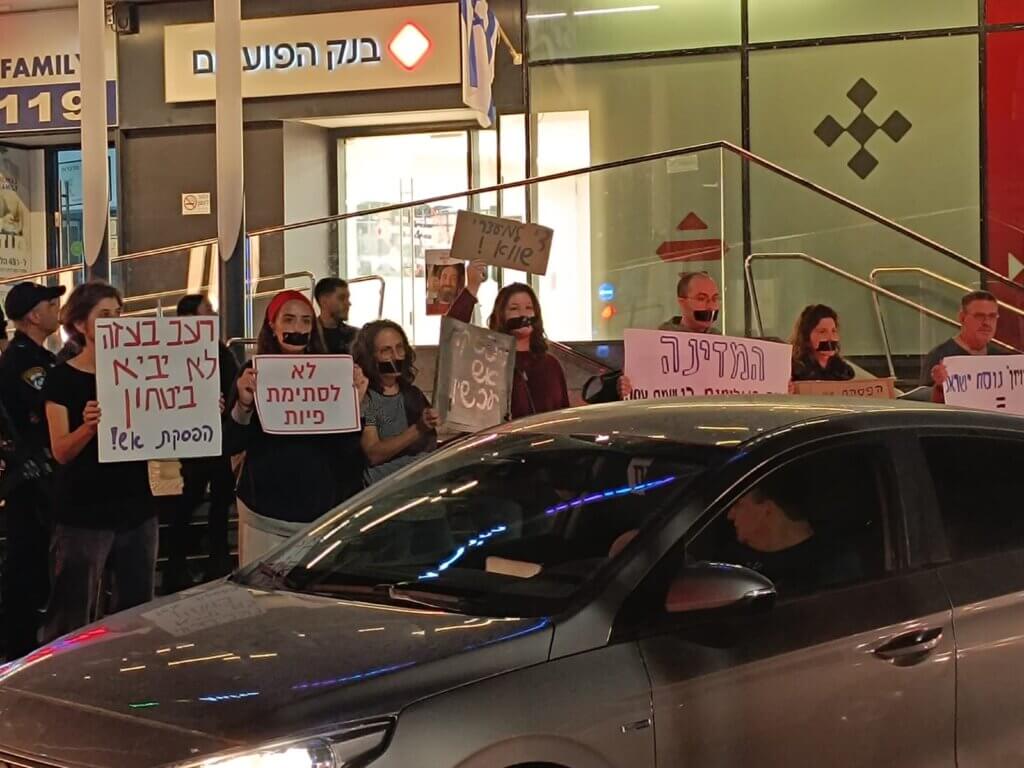
On Sunday, November 12, there was another attempt by (mostly Jewish) peace activists in Haifa to demonstrate against the war and the silencing of dissent. The call was issued only a few hours before the designated time and distributed via closed WhatsApp groups. The protest was to take place in the Horev Center, in the heart of the White-affluent part of the city.
You will not be surprised to learn that the demonstration was suppressed by the police before it properly started. Its banner was confiscated, and three out of the twenty protesters were detained. It ended with a violent attack by random bystanders against the demonstrators.
As we gathered around the police headquarters in downtown Haifa to wait for the release of the detainees, I noticed that security around the police compound was gradually intensifying. A year ago, we could wait near the main entrance of the compound. Some months later, they declared a closed security zone in the nearby square. Last Sunday, they also closed their side of the street, and we had to wait even further away.
The detainees were released from the police station that same night, unlike the detainees from the Herak demonstration on October 18, who spent the night in custody, and the police requested their remand (but they were released by the court).
‘Dangerous’ graffiti
Over the weekend, some Arabic graffiti in solidarity with the people of Gaza appeared in Haifa. On Sunday, two Palestinians in their twenties, a woman and a man, were detained and taken into interrogation. On Monday morning, they were brought before the remand judge on duty.
Usually, by local standards, people are not supposed to spend time in prison for graffiti. But, as the prosecutor and the judge stressed again and again, these are not usual times. To justify the remand, the prosecution added the charge of “behavior that might disturb public order.” They explained that they were considering interrogating the detainees about incitement but were waiting for expert legal advice about the content of the writings on the walls. The two detainees, in separate hearings, were “presented” through WhatsApp video chat from the police station through the prosecutor’s cellphone. The judge remanded their detention for one day.
On Tuesday, we learned that the detainees had been transferred from police custody to “security prisons” – the man to Megiddo and the woman to Ha-Sharon. The two hearings were combined for efficiency. It had not been clear what about the graffiti had disturbed the prosecution so much. What we learned in court was that one of the graffiti tags said, “Sorry my dear Gaza,” and the other said, “Gaza is being annihilated.”
It was an interesting hearing today, showing how different parts and different people in the same oppressive apparatus can push in different directions. Some continue to escalate the “war effort” against all Palestinians everywhere, while others try to resume some normality, at least in local society inside ’48.
On the legal level, an important milestone was the High Court decision from November 8. It was an appeal by Hadash and others (we reported about it here) against the police decision not to allow two planned anti-war demonstrations. While rejecting the appeal on the technical grounds that the police did not have enough forces “to preserve order,” the court declared that there was no general ban on protest during wartime and that solidarity with civilians in Gaza, unlike solidarity with Hamas, is not an offense.
During the hearing today, the judge quoted that position and said there is nothing especially “dangerous” about the two detainees. The term “dangerousness” is regularly used as a code word in court to distinguish between the regular criminal law, which is applied liberally, and a completely different set of standards that apply to Palestinians in the framework of “the conflict.” By this double standard, a detainee who is suspected of attempted criminal murder can be released on bail, as he is not intrinsically dangerous, whereas someone suspected of posting “dangerous” comments on Facebook could be held in prison indefinitely.
Apparently, the police received legal advice that the contents of the graffiti did not constitute “incitement.” The lawyer for the defense, Afnan Khalifa, suggested that the two should be released on bail. The state prosecutor, a uniformed female officer, made clear this was not acceptable. “We are at war now!” she stressed repeatedly. If there was a decision to release them, the state said it would ask for a postponement of the decision so it could appeal.
Over the last decades, the Israeli prisons authority developed a very militant “special unit” called Nakhshon, which is responsible, among other things, for bringing detainees to court. They are dreaded by all prisoners for their sadistic violence. Within the court system, they are the government unto itself. In this current special period, while detainees are not being brought to court hearings, their role is to organize the “presence” of the detainees by Skype.
In today’s hearing, like in many hearings that I have attended lately, Skype did not work. As in some recent hearings, including yesterday’s, the judge suggested to “bring” the detainees via WhatsApp. The Nakhshon officer in court sternly refused. He said that security detainees are not allowed to use WhatsApp, as it is connected to the internet. The judge was not convinced. He tried to inquire what damage the detainees could do, as WhatsApp is activated for them on police cellphones. The Nakhshon was resolute, claiming that allowing security detainees access to WhatsApp might have severe implications. Finally, Adv. Khalifa was forced to agree to keep her clients updated on their unfolding case through regular audio-only phone calls.
The judge concluded that the interrogation was about to be exhausted and remanded until tomorrow.
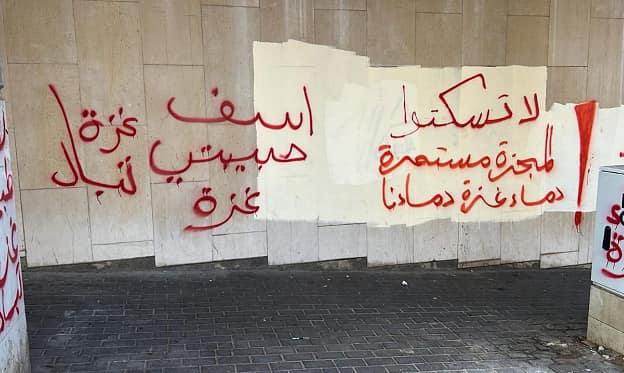
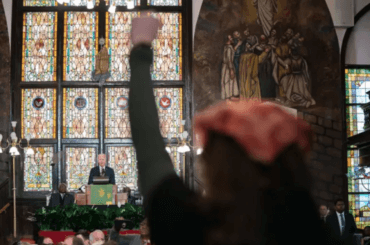
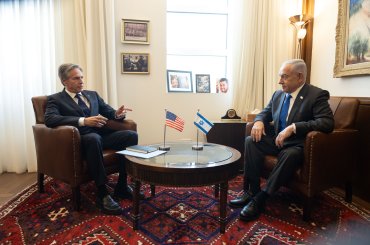
“Every day, we encounter more mind-blowing examples of political repression…”
Next up: Nakba 2.0.
“Two Israeli lawmakers call on European countries to take in Gaza refugees…In a rare display of cross-party solidarity, Danny Danon (Likud) and Ram Ben-Barak (Yesh Atid) published an op-ed piece for the Wall Street Journal on Tuesday, calling for “countries around the world to accept limited numbers of Gazan families who have expressed a desire to relocate.”
https://www.timesofisrael.com/two-israeli-lawmakers-call-on-european-countries-to-take-in-gaza-refugees/